

Schizophrenia Treatment Without Antipsychotic Drugs and the Legacy of Loren Mosher. Dyslexia Doesn’t Work the Way We Thought It Did. Dyslexia is not just about reading, or even language.
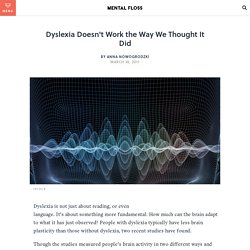
It’s about something more fundamental: How much can the brain adapt to what it has just observed? People with dyslexia typically have less brain plasticity than those without dyslexia, two recent studies have found. Both sets of researchers found that people with dyslexia more quickly forget recent events. This type of memory is called incidental or implicit memory, and includes anything you didn't know you needed to remember when it happened.
Because of how quickly their implicit memory fades, dyslexics' brains don't adapt as much after reading or hearing something repeatedly—which is perhaps why it is harder for their brains to process the words they read. Your brain generally benefits from repetition because it relates a stimulus to what you've already experienced—like a note you have heard before or a face you’ve seen. The MIT study, led by John Gabrieli, found similar results through a different experiment. Novel Roles for Immune Molecules in Neural Development: Implications for Neurodevelopmental Disorders. Antidepressant-induced akathisia-related homicides associated with diminishing mutations in metabolizing genes of the CYP450 family. The effects of detection and treatment on the outcome of major depression in primary care: a naturalistic study in 15 cities.
Impaired adult myelination in the prefrontal cortex of socially isolated mice. Dreaming of animals and other warning signs of neurodegeneration. The latest issue of Nature contains an Outlook supplement about the health impacts of poor sleep, including a feature I wrote about the link between sleep disturbances and neurodegenerative diseases, called "Amyloid awakenings".
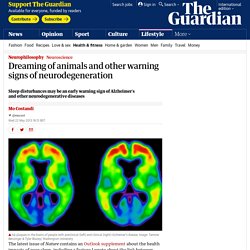
Alzheimer's disease: synapses gone cold. Disrupted sleep may predict Alzheimer’s : Nature News & Comment. Steve Prezant/Corbis Disturbed sleep paterns can predict a future Alzheimer's diagnosis.

Why poor sleep and forgetfulness plague the ageing brain : Nature News & Comment. Mander et al. / Ref 1 Ageing brains show a weakening in brain waves associated with deep sleep (right) compared with younger adults (left), with consequent memory impairments.
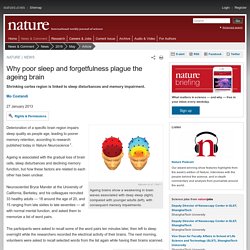
Deterioration of a specific brain region impairs sleep quality as people age, leading to poorer memory retention, according to research published today in Nature Neuroscience1. Ageing is associated with the gradual loss of brain cells, sleep disturbances and declining memory function, but how these factors are related to each other has been unclear. Loss of mTOR-Dependent Macroautophagy Causes Autistic-like Synaptic Pruning Deficits. (A) Representative western blots of p-mTOR, t-mTOR, p-S6, t-S6, PSD95, and synapsin I in temporal lobe of ASD patients and control subjects aged 2–9 years (ASD, n = 8; controls, n = 7) and 13–19 years (ASD, n = 5; controls, n = 9).
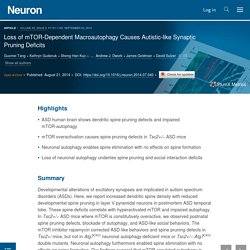
A, ASD patients; C, controls. (B–E) The relative density (mean ± SD) for p-mTOR (B) and p-S6 (C) were normalized to t-mTOR and t-S6, respectively. PSD95 (D) and synapsin I (E) levels were normalized to actin and are presented as scatterplots for ASD patients and controls in two age groups. Each point represents each individual subject. ∗∗p < 0.01; ∗∗∗p < 0.001 (two-way ANOVA, Bonferroni’s post hoc test). Brain’s immune cells hyperactive in schizophrenia. The brain’s immune cells are hyperactive in people who are at risk of developing schizophrenia, as well as during the earliest stages of the disease, according to a new study by researchers at the MRC Clinical Sciences Centre in London.
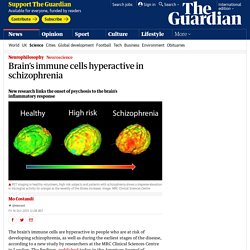
The findings, published today in the American Journal of Psychiatry, suggest that inflammatory processes play an important role in the development of the disease, and raise the possibility that it could be treated with drugs that block or reduce this cellular response. Microglial Activity in People at Ultra High Risk of Psychosis and in Schizophrenia: An [11C]PBR28 PET Brain Imaging Study. Schizophrenia is a severe psychiatric disorder characterized by psychotic and cognitive symptoms, and it is a leading cause of global disease burden ().
![Microglial Activity in People at Ultra High Risk of Psychosis and in Schizophrenia: An [11C]PBR28 PET Brain Imaging Study](http://cdn.pearltrees.com/s/pic/th/microglial-schizophrenia-205028642)
It is generally preceded by a prodromal phase of attenuated psychotic symptoms and functional impairment (). Individuals meeting standardized criteria for this phase have an ultra high risk for developing a psychotic disorder, in most cases schizophrenia (). Approximately 35% of high-risk persons will develop a psychotic disorder within 24 months (). While the pathoetiology of schizophrenia is not fully understood, there is increasing evidence for the involvement of neuroinflammatory processes. Dormant viruses may cause motor neuron disease when awoken. Sleeping viruses that lurk inside the human genome may “reawaken” and contribute to the development of motor neuron disease, according to new research published today in the journal Science Translational Medicine.

Human endogenous retroviruses (HERVs) are ancient microbial remnants that integrated into our chromosomes during repeated infections that occurred over several million years of our evolution. Although accounting for up to 8% of human DNA, most of them have acquired multiple genetic mutations that made them harmless, and are usually considered as “junk” DNA. In 2011, Avindra Nath and his colleagues reported that proteins synthesized by one such virus, called HERV-K, are highly concentrated in the brains of patients who died of amyotrophic lateral sclerosis (ALS), a progressive and fatal neurodegenerative disease which destroys the motor neurons that control speech, movement, swallowing and breathing, leading to death between three to five years after the symptoms first appear. 2 The putative neurodegenerative links. Neural correlates of maintaining oneâs political beliefs in the face of counterevidence. Ahluwalia, R.
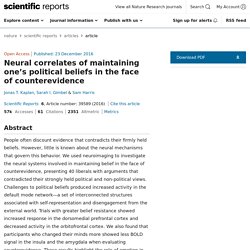
Examination of psychological processes underlying resistance to persuasion. J Consum Res 27, 217–232, doi: 10.1086/314321 (2000).Article Google Scholar Jacks, J. Z. & Devine, P. G. The Encultured Brain: Why Neuroanthropology? Why Now? Why Neuroanthropology?
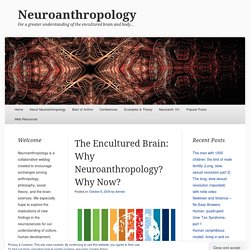
Why Now? By Greg Downey and Daniel Lende. : Susan Schaller and the Story of a Contemporary Miracle, by Richard Whittaker. Are there adults living today who have not learned any language, who cannot even conceive of language? They do exist, although, according to Susan Schaller, there's almost nothing written about them. Perhaps that's because, according to the prevailing views of experts, adults who have not acquired language will never be able to do so. This was not an area to which I'd given a single thought until my unexpected meeting with a stranger one day in a Berkeley restaurant.
Ever wonder how kids with autism see the world? That's all it may take to understand them. At one of the worst points, she was banging her head on the floor and the walls of her bedroom, raging and crying. And I was doing the same because I just didn't know what else to do anymore. Something had triggered a full-on, pupil-dilated tantrum for my then-3-year-old, Emma, complete with hair-pulling and biting — both herself and me. That's Emma around age 3. That sweet kid having a meltdown? HEARTBREAKING, let me tell you. Feeling just as helpless as I had the last dozen times this happened, I ticked down a mental checklist: Weird food?
This is autism. A piece of the puzzle: Eight autism-related mutations in one gene. Scientists have identified a hotspot for autism-related mutations in a single gene. By studying data from thousands of genomes of people with autism-spectrum disorders, an interdisciplinary team of USC researchers homed in on a gene called TRIO.
The TRIO gene produces a protein that influences the development and strength—or weakness—of the connections between brain cells. The scientists found eight autism-associated mutations clustered within a small region of the Trio protein. Memor.ability.